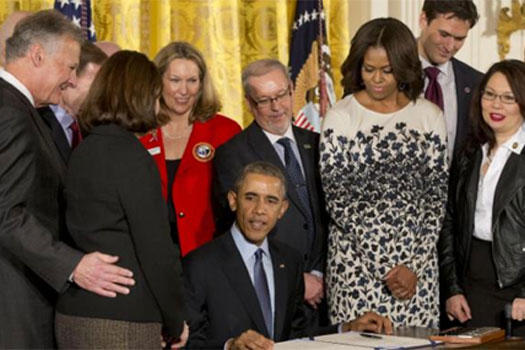President Obama signed the Clay Hunt Suicide Prevention for American Veterans Act Thursday that will provide $22 million to help boost programs that look to reduce the veteran suicide rate that has climbed to 22 veterans each day.
The suicide prevention legislation is named for a former Marine who died by suicide in 2011 after losing his battle with mental health issues related to his service in Afghanistan. Hunt was 28.
In remarks before signing the bill at the White House, Obama said Hunt did everything he could to fight against the post-traumatic stress symptoms that plagued him.
He sought help from the VA, got involved in helping other veterans, and even volunteered with a relief organization assisting people in Haiti.He also made a public service announcement encouraging other veterans with mental health issues to get help, Obama said.
But the right combination of help, therapy and medication was not found for Hunt in time, Obama said.
"For many the war goes on," he said. They deal with flashbacks and nightmares that will not go away.
Obama said the suicide deaths of veterans is a tragedy for their families and the country.
'"Every single veteran has something extraordinary to give to the country. Every single one," Obama said.
The Senate unanimously approved the bill a year after it was blocked in the Senate by Sen. Tom Coburn, R-Oklahoma – who retired from Congress before the start of the new session.
The new law will require the Pentagon and the Veterans Affairs Department to submit their suicide prevention programs to independent reviews and would establish a website to provide information on mental health services available to veterans.
It also would offer financial incentives to psychiatrists who agree to work for the VA and assist veterans transitioning from active duty. The incentives include paying off student debt.
House Speaker Rep. John Boehner and Sen. Orin Hatch, R-Utah (acting as Senate president) signed the bill on Tuesday during a ceremony attended by Hunts' parents, Susan and Richard Selke, and members of Iraq and Afghanistan Veterans of America.
The Clay Hunt bill won overwhelming support in the House last year and was expected to gain swift passage through the Senate when it reached the floor in mid-December. Coburn blocked it after he said he opposed the $22 million package because it duplicated existing VA programs and was not paid for by offsets elsewhere in the budget.
The legislative maneuver was slammed by veterans' groups and military associations, which vowed to get the bill passed early in the current session.
Paul Rieckhoff, chief executive officer and founder of Iraq and Afghanistan Veterans of America, said Coburn's actions would cost the lives of veterans. The VA has estimated that, on average, 22 veterans die by suicide each day.
"It's sickening to think another 22 veterans will die by suicide today and every day we fail to expand mental health care for our vets," Rieckhoff said.
Once reintroduced, the bill found easy passage through the House and Senate. An expected Senate vote on Feb. 2 was delayed for one day only because major snowstorms prevented many members from getting back to Washington on time.
The bill passed 99-0 on Feb. 3, with only Sen. Mark Kirk, R-Illinois, unavailable to vote. Had he been there the vote would have been 100-0, his office said.
Sen. Johnny Isakson, R-Georgia, chairman of the Senate Veterans Affairs Committee, rejected the argument that the bill duplicated existing programs. He said the Senate tackled the financial issue by taking internally generated funds.
-- Bryant Jordan can be reached at bryant.jordan@military.com






























